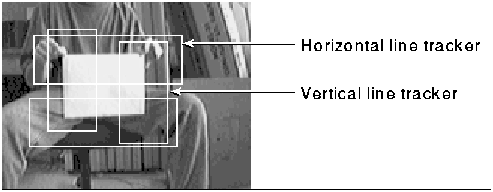

Members of the group:
We are working to build real-time vision systems for embodied agents. In particular, we want to use vision to acquire useful knowledge about space for robot navigation, map-building, and manipulation tasks.

Our approach to visual search and object recognition is a combination of model-guided image exploration and reactive control of imaging parameters. A perceptual schema is a type of object model which is essentially a graph of primitive features such as lines and corners and their spatial relationships in 2 dimensions. The image above shows a snapshot of a simple perceptual schema in operation which recognizes rectangles as two horizontal lines and two vertical lines in the correct configuration.
The image shows a group of four primitive feature trackers tracking the line segments that make up a rectangle in the image. Each primitive feature tracker is a software agent which operates on only the image data outlined by the rectangular box. A reactive control law adjusts the window shape, size, and position to keep the segment feature in view. A collection of these trackers can be distributed across a network of processors; each one requires a maximum of 1k pixels pre frame, so the total bandwidth usage is small.
Current work is integrating biological models of attention direction into schemas to allow efficient visual search.
We have developed a distributed framework for visual behaviors called ARGUS (here's a technical overview of the system). ARGUS addresses the problem of visual search and tracking with an uncalibrated camera and limited computational resources.
Current directions of research with ARGUS include:
Most of the lower levels of ARGUS are written in C++ using posix threads. and the The Standard Template Library (STL). The higher level code is being developed in a threaded, object oriented variant of Scheme, RScheme, which is under development here in the OOPS Research Group.